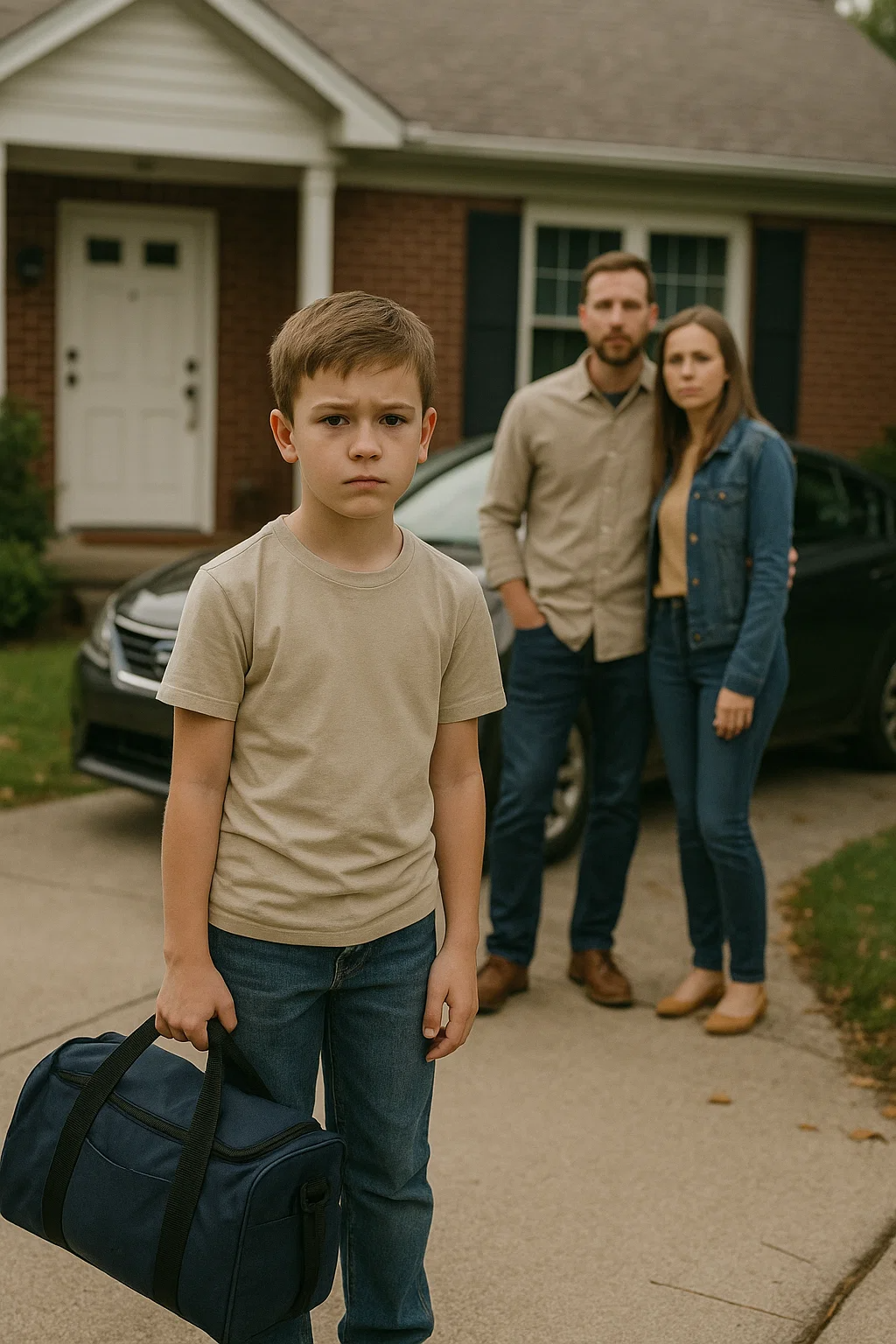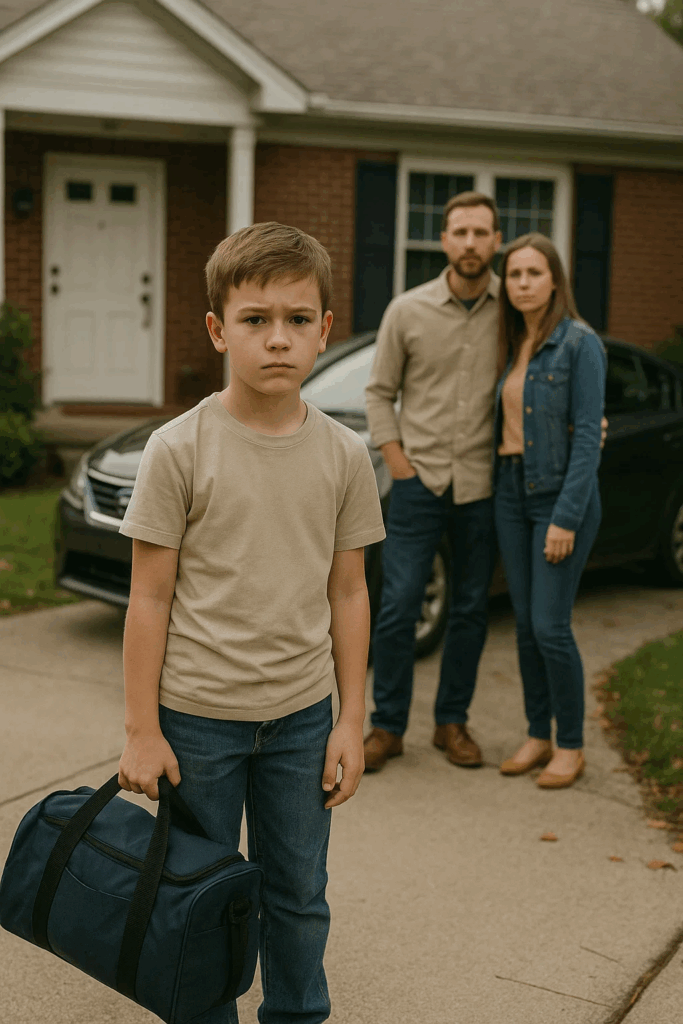They Sent Me to Foster Care at Twelve So They Could Chase Their Dreams. Now They Want Back In—And I Finally Told Them the Truth They Deserved
My name is Adam, and this is the story of how my parents decided I was expendable. At twelve years old, they handed me over to foster care so they could jet around the world with my sister. More than ten years later, they showed up at my door—broke, desperate, and begging. This time, I didn’t hold back. I gave them the answer they had earned.
Childhood in the Background
Growing up, I thought my life was normal. My dad—Greg. My mom—Laura. My older sister—Emma. On the surface, we looked like a picture-perfect family. Birthday candles, family dinners, vacation snapshots. But underneath, the balance was skewed.
Emma was the shining star. Her artwork covered every inch of the fridge. She got standing ovations for piano recitals and spelling bees. I wasn’t completely invisible, but I may as well have been background noise. When I showed them a drawing, I’d get a distracted, “That’s nice, Adam,” before they turned back to Emma’s latest achievement.
I didn’t blame her—she was just living the role they gave her. But for me, it carved out a quiet, nameless hurt. And then, one day when I was twelve, that ache became something much worse.

The Day They Cast Me Aside
It started with my mom’s voice calling me downstairs. There was something brittle in her tone that made my stomach twist.
In the living room, they sat side by side on the couch, stiff and serious.
“Sit down, Adam,” my dad said sharply, like he was chairing a meeting.
My mom sighed. “Honey, things have been… hard financially. We’ve made a tough choice. We can’t keep supporting you right now.”
I froze. Supporting me? Like I was a bill they could cancel?
Mom kept going, her face a mask of fake sympathy. “We found a foster home for you. Just until we get on our feet again. It’s temporary.”
The word rattled in my head. Temporary. Even then, I knew it was a lie.
“Why not Emma?” I whispered.
Her face hardened. “Emma needs stability. She’s in school.”
As if I didn’t.
Before I could protest, Dad cut in. “This isn’t about choosing, Adam. It’s what makes sense.”
That’s when I broke. Twelve years old, sobbing, realizing they were giving me away. Mom tried to hug me, but I shoved her off.
The next morning, they stuffed a duffel bag with my clothes, drove me across town, and left me on the doorstep of strangers.
“Let’s get this over with,” Dad muttered.
Get this over with. Like I was an errand.
The Millers, my foster couple, seemed kind. But I barely noticed. My parents gave me a stiff hug, a quick kiss, and then they were gone. I stared after their car until it disappeared. I thought they’d come back.
They never did.
A New Home, an Old Scar
The Millers were steady in a way my parents had never been. Mrs. Miller made pancakes. Mr. Miller filled dinner with random science trivia. They weren’t perfect, but they were present.
Still, I clung to my parents’ promise: temporary. I counted days, then weeks, then months. No calls. No letters. Nothing.
When I was fifteen, I searched for them online. What I found gutted me. A glossy travel blog, filled with smiling photos of them and Emma on beaches, in resorts, hiking mountains. The captions bragged: “Finally living our dream life.”
And the line that cut deepest? “We’ve found freedom by letting go of the past.”
I wasn’t their son anymore. I was “the past.” I wasn’t a child they loved. I was baggage they’d abandoned and dressed up as “simplicity.”
They hadn’t just left me. They had erased me.
Discovering the Truth
Anger replaced grief. Then suspicion crept in. Under one blog post, I noticed comments:
“Must be nice to run away from everything. Hope it doesn’t catch up with you.”
“Guess ditching responsibility was worth it, huh?”
Running away?
I told the Millers. Mr. Miller’s jaw clenched. “Adam, what they did isn’t just wrong—it’s unforgivable.”
Not long after, a letter arrived for me from a law office. Inside were documents about unpaid debts—my parents’ debts.
And suddenly it clicked. They hadn’t left me because they “couldn’t afford” me. They left because I was a liability in their escape plan. Shedding me made it easier to run.
That day, something in me hardened. I stopped waiting.
Building My Own Future
I threw myself into school. Debate team, part-time bookstore job, real friends. Every paycheck felt like a brick in a foundation I was building myself.
The Millers became my true family. They taught me budgeting, responsibility, and what it meant to stay.
When I got a full-ride to college, Mrs. Miller cried. Mr. Miller hugged me so hard I thought my ribs would snap.
I posted the acceptance online. Hours later, a comment popped up from my mom: “We’re so proud of you, Adam. Let’s reconnect.”
I deleted it instantly. They didn’t get to claim me now.
Graduation Day Confrontation
At high school graduation, the Millers cheered louder than anyone. My best friend Ryan was there. Even Emma showed up quietly, for me this time.
Then I saw them. Greg and Laura—tacky vacation shirts, entitled smiles—pushing toward me.
“Adam!” Mom beamed. “We’re so proud. This is such a special day for all of us.”
All of us. I almost laughed.
“You don’t get to call yourselves my family,” I said evenly. “You abandoned me. You partied while I survived. Don’t pretend this was for me.”
The air went still. And then Emma did something I never expected. She stepped forward.
“Don’t ruin this for him,” she said to them. “You’ve already done enough.”
For the first time, she stood with me.
Their Downfall
As I moved forward, they unraveled. Emma later found out they had burned through their savings, squatting with relatives, alienating everyone.
One day, she uncovered a storage box full of unpaid bills and foreclosure notices. Buried inside was a lawyer’s letter about “reducing dependents to streamline finances.”
My name was listed. A liability to be cut.
Later, when a documentary about resilience featured my story, the truth came out. Not only had they abandoned me—they’d also been running from fraud charges.
The documentary went viral. Foster kids wrote to me, thanking me for making them feel seen. My parents tried spinning themselves as victims of an “ungrateful son.” It backfired. Their crowdfunding campaigns got flagged as scams. Relatives stopped answering their calls. They were left with nothing.
Their Final Attempt
When I turned thirty, they sent a letter:
We’re sorry. We didn’t know how to be parents. We’re alone now. Please see us before it’s too late.
I read it three times. Then I set it on fire.
Because closure doesn’t always mean forgiveness. Sometimes it means choosing yourself, fully.
What I Learned
At twelve, I thought being abandoned meant I had no worth.
At eighteen, I thought succeeding would prove them wrong.
At twenty-five, I thought exposing them would heal me.
By thirty, I finally understood: their choices were never about me. They were about them—their greed, their fear, their selfishness.
And I am not them.
That’s the greatest victory.
A New Legacy
Today, I run a nonprofit teaching financial literacy to foster kids. We’ve funded scholarships, created mentorships, and shown kids that being abandoned doesn’t mean being broken.
At one ceremony, I told the crowd: “This is for every twelve-year-old who thought they didn’t matter. You matter. You always did.”
The applause roared.
Emma, standing with her children, mouthed: I’m proud of you.
That meant everything.
As for Greg and Laura? Last I heard, they’re drifting in a rusted camper, scamming whoever still listens.
Do I pity them? Not anymore.
They built their ruin with their own hands. I just stopped holding up the walls.
Because family isn’t about blood. It’s about who stays. And I have that.
That’s enough.


